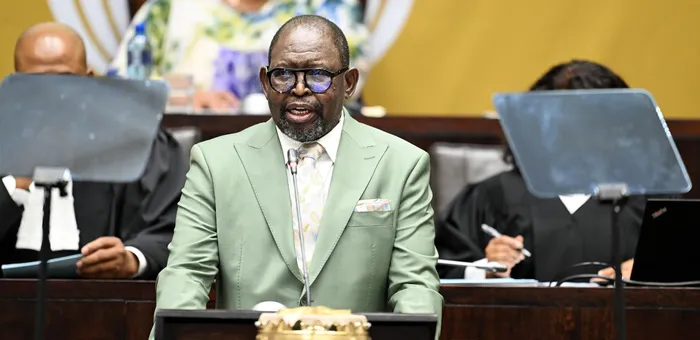
Finance Minister Enoch Godongwana announced the progress that has been made in identifying ghost workers during his 2025 Medium Term Budget Policy Statement (MTBS) on Wednesday.
Image: Parliament RSA/Supplied
South Africa’s latest Mid-term Budget Speech tabled on Wednesday has drawn a cautiously optimistic response from key voices in finance, youth development, and energy.
Jurgen Eckmann, wealth manager at Consult by Momentum, says: “The Minister’s upbeat tone today reflects what many investors have been hoping to hear for years: that South Africa’s finances are finally on a stronger footing.”
The country’s removal from the FATF grey list has helped restore investor confidence, though it remains uncertain whether this will translate into a surge in foreign direct investment. More notably, for the first time since 2008, government debt is expected to stabilise and South Africa will post a primary budget surplus, meaning core spending is being funded through tax revenue rather than new borrowing.
Eckmann called this “an important shift, showing that the fiscus is starting to live within its means.”
The revised inflation target of 3%, alongside lower debt-service costs, signals an intent to create space for reduced borrowing costs over time. However, this tighter target may require interest rates to remain elevated in the near term. The Minister will need to carefully balance inflation management with the need to support growth, which could slow before the benefits of reform are fully realised.
On the operational front, the new Targeted and Responsible Savings (TARS) initiative is a welcome move, he says. By reducing duplication and waste, it sets the stage for more disciplined municipal and departmental spending.
Eckmann added that “involving the private sector in driving this kind of efficiency could further help ensure that resources are used more effectively, with less wastage.”
From a youth development perspective, Nkosinathi Mahlangu, youth employment and entrepreneurship specialist at the Momentum Group Foundation, welcomed the Minister’s focus on infrastructure as a catalyst for growth.
“Large-scale investments in energy, water, and logistics can be powerful engines for job creation, particularly for young people seeking technical and vocational opportunities,” he says.
The Early Retirement Programme could also open space for new entrants into the public service, enabling institutional renewal and knowledge transfer across generations. However, Mahlangu noted that the Statement was “thin on the mechanisms that will intentionally link these opportunities to young people, and on the data needed to measure real progress.”
He pointed out the absence of youth unemployment figures, NEET rates, and labour absorption targets, warning that “without metrics, the youth employment narrative risks becoming a moral rather than measurable commitment.”
While fiscal reform lays the foundation for inclusive growth, Mahlangu stressed that South Africa’s recovery depends on turning policy into pathways for inclusion. More detail is needed, and it is hoped that next year’s Budget Speech will provide it.
In the energy sector, David McDonald, CEO of SolarAfrica, described the decision to allow private investment in high-voltage transmission lines as “a big step forward for South Africa’s energy future.” Until now, the private sector’s role in strengthening the grid has been largely limited to generation, he says. He says this new policy opens the door to expanding the transmission network, an essential move toward energy security.
“At SolarAfrica, we’re already seeing how this kind of collaboration works in practice. Our SunCentral solar farm in the Northern Cape includes the new Aquila Main Transmission Substation, which we’re developing with Eskom to feed up to 2 GW of renewable power into the grid for wheeling across the country.” McDonald calls it: “exactly the kind of public-private model that gets South Africa moving, more capacity on the grid, more clean power for business, and ultimately, more stability for the economy.”
PERSONAL FINANCE